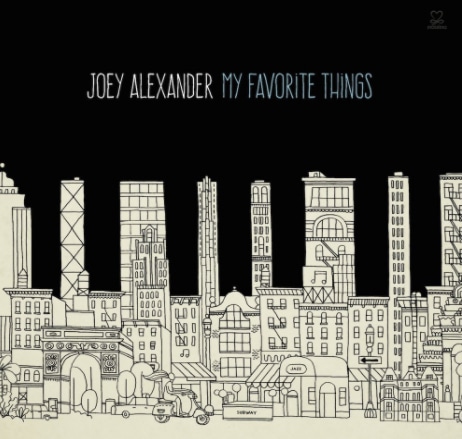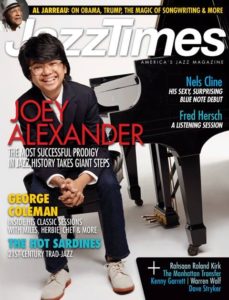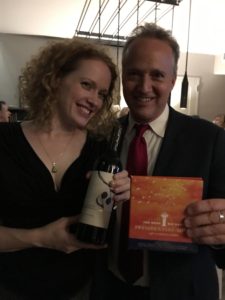Jana Herzen’s Motema: Communicating and Connecting Through Music
BY PAKSY PLACKIS-CHENG
Motema represents 60 musicians and 170 records. The music label introduced the world to Gregory Porter by releasing his first two records. Motema also produced the debut album (and is responsible for the latest release) of Joey Alexander. Joey Alexander, named One of the Next Generation Leaders, by Time Magazine, was also nominated for a Grammy for Best Improvised Jazz Solo 2016.
impactmania sat down with Motema’s Founder and CEO, Jana Herzen in Harlem, New York. Herzen speaks about Motema’s three signing qualities, the process of releasing Joey Alexander’s album, and shares how listening is the most effective way to make an impact.
What is a nice girl like you running a record label for?
[Laughs.] That’s a really good question. It’s my destiny. It wasn’t exactly a choice. I’m a musician. I was making my record and tried to shop it around when the entire industry was tumbling. I did get a bite from Island Records, a record company I respected hugely. I started talking to Dennis Nixon, and he said, “I love this but don’t hold your breath, ‘cause I don’t think we’re signing anything this year.” A big shift was happening. I said, “Well, I’m going to put it out myself.”
Tell me about Motema’s criteria for signing on musicians.
My three signing qualities:
I like to work with people who have mastered their craft, who are serious about their playing, singing, writing, composing, or arranging.
I like to work with people who know how to change the molecules in the room when they play. A phrase I stole from Babatunde Lea a fantastic drummer, who worked with me in California. When you go see an amazing performance, your molecules change. The whole room gets electrified. People become mesmerized by what’s going on.
Third, I like to work with people who actually care about making a positive difference in the world, which is not true of all musicians. Some musicians really want to be famous, some musicians want to get laid. [Laughs.]
How do you cut through the layers and find out what an artist is really about?
I don’t even have to hear them play. Somebody talks to me about his or her music. Sometimes the way they write to me, how they comport themselves make me have a feeling that they’re really good.
We get a lot of stuff that is great. As my friend Mary Ann Topper, a famous jazz manager, said, “Jana, you can love them all but you can’t sign them all.”
You get tempted to overload yourself ‘cause the music is so good. More and more I have to cut back, be very selective. You can usually get a feel for the quality of the person. It is important that they have potential to have a major touring career. These days, this is more important than ever. It used to be that you could have a record that would sell very well through retail without necessarily touring, but it is different now.
Walk me through the process of putting out a record.
There are two kinds of records that we do here. The first is what we call a license deal. That means that the artists has finished their record, and they’re shopping it around, trying to find a label to pick it up and market it.
The other option is working with someone who has not yet made a record. For example, Joey Alexander came here when he was 11 years old. At first I thought to myself, “Does an 11 year old boy need a record label? I don’t think so.” But when I learned, he’d been out there performing for three years, won contests, and played all over, it became clear he was ready to make a record. There’s a certain point you’re kinda pregnant with it — you can’t go further in your music career without making a recording. “We can’t hold him back, just ’cause he’s 11,” I thought, “And at least, if we sign him, we’d care about his childhood.” It really mattered to me, ‘cause 11 is a tender age.

Joey Alexander with Jana Herzen on the first day they met. Photo taken by Joey’s mother, Fara Leonora.
Record deal
So let’s take a record that we’re going to do from scratch. The first thing we have to do is come up with a deal. Typically if we’re going to be investing in and launching an artist, we want a couple of options in the deal. Joey Alexander didn’t have a manager; so we worked with his lawyer to finish the deal.
Next, we have to figure out which musicians are going to play on the record. A jazz record is much simpler to make than like a pop record. What’s amazing about jazz musicians, they literally go in the studio, play the music, and they’re done. We gave Joey three days in the studio; figuring a young guy might need time. Little did we know he would walk into that studio and play every song with no punch-ins! They were all great takes. Every single one and he didn’t make mistakes. I was like, “What? That’s unbelievable.” Because everybody does some little punch-ins, little fixes in the studio. He’s just so honest. He’s so connected to his own inspiration.
That’s a big part of his success; nobody told him it was difficult. I’m actually a pretty decent jazz player, but when I first wanted to play jazz, I was definitely told, “No, that’s too hard for you.” I counsel anybody who is teaching kids, “Let them play what they want as early as they want — English is hard, but babies learn to do it.” [Laughs.] Why not music?
Musicians
We asked Joey, “Which musicians would you like to work with?” His first choices were Jack DeJonnett and Christian McBride. They turned out not to be available. We ended up with Ulysses Owens and Larry Grenadier and Jason Olaine to produce, who is an award-winning producer, and who initially brought the project to us. There’s an old rule in the theater: If you have an inexperienced director, get experienced actors. If you have an inexperienced actor, get an experienced director.
In the music industry, the producer is like the director. The person who is in charge of making the music manifest. What studio it’ll be in, which musicians, and listening to the takes and deciding which ones will go on the record. The executive producer is the one who brings the money to the table.
Recording – Mix
Then, you mix it. You might add some overdubs, some horns, but we didn’t on Joey’s record at all. Very authentic jazz musicians prefer not to have overdubs. On a pop record, they might lay down the drums, bass, and then the guitar. They re-punch it. It’s a more slick sort of thing.

Joey Alexander was 11 years old when he released his first album My Favorite Things. The record was produced by Motema.
Package – Marketing
Then you have to package the record. You think about the nature of the recording. In the case of Joey Alexander, we had a deep conversation about this. Are we putting this amazingly magnetic child on the front of his album cover? We decided not. We did not want to play the ‘cute’ card. We wanted to stress his artistry. We also didn’t want to take somebody who’s only 11 years old and use his image as a product.
He wasn’t old enough to make that decision for himself. We didn’t feel it was right for us to make that decision. He called the project My Favorite Things after one of the songs on the album, a musical theater song that was turned into a jazz classic by Coltrane. Joey did his own version of it. For inspiration for the cover, we asked him, what were his favorite things? He said, “bicycles, trains, Indonesia…” We put illustrations of them on his album cover. These are subtle things people might never notice, but they all work together in a holistic way.

Joey Alexander
The latest development for My Favorite Things is that there is this country music star, Kelsea Ballerini — the first country artist to ever have a platinum single and two gold singles on her debut release. The music director for the Country Music Awards saw Joey and fell in love with his musicianship. He invited Joey and his trio to do a duet with Ballerini for the CMA Christmas Special.
It’s a miracle, really. For somebody to take a jazz artist and say they want to pair them up with country star in this way. Wynton Marsalis has done some stuff with Willie Nelson. This cross over thing can happen, but for them to request that and then for it to actually happen for Joey’s jazz trio to play on the show. It’s amazing.
Tell me why story is everything?
I’m a songwriter and a script doctor for plays and movies. Story is everything for me. If I sign somebody, the first question is, is there a good story here? Obviously, Joey Alexander’s an amazing story.
Ted Nash, who released the Presidential Suite… that’s an amazing story. The idea of letting speeches be your inspiration for your music, an interesting concept. Then, also Ted Nash’s history [Ted Nash’s father, Dick Nash, and uncle, the late Ted Nash, were both well-known jazz and studio musicians] and why it is that he would do it. [Nash’s parents, his mother especially, were very involved in civil rights].

Ted Nash with Kristen Lee Sergeant at the Presidential Suite CD release, New York.
Pedrito Martinez, what a story that is. He’s a street kid from Cuba who has become one of the top congueros [conga drummer] in Latin music. Nobody should be able to play and sing that well! [Laughs.] Everybody has a story if they really look at it, there’s something there. Our job is to find out what the story is. Artists whose music is spiritually important to them do the best on my label.
What’s needed for social impact?
In my own little corner, it is to know yourself, know what you have to offer, and do your best to offer it in the best and clearest way.
Everybody has impact, everybody. When a person is in a bad mood, and they walk down the street, they impact the people around them.
The most effective impact, interestingly, is listening. The feeling of actually being heard is huge for people. Impact sounds like a very masculine thing. You’ve got to do something to impact, ‘cause that has power. The ears are the most important part of the music. If we started listening to the whispers, and making changes from that point, that might result in that peaceful world we’re looking for.
What would you say to musicians on how to impact people with their music?
Western music is all based on African rhythm originally. It’s all based on that heartbeat. People used to communicate with these drums from town to town. In order to have impact, you first need to know who you are and what matters to you most. Then you need to do your work in an area that matters in a huge way to you.
For me, it’s communication. I break out in hives when the communication is wrong in the office. I love nothing better than when you see all these humans communicating in peace and at a high level and sophistication of subtlety. That’s why jazz has caught my attention for its amazing level of communication.
Joey is getting a lot of attention for that; how can a 13 year old boy have this level of communication? Many, many, many musicians are playing brilliantly, but they’re not having an amazing conversation with their band mates. Everybody is in their own lane doing their thing.
Where does the magic come in? When you care. When you have something burning to say. That’s another thing I guess that Joey’s dad told him, “You have to be telling a story.”
There is a lack of communication, not even among musicians, but in the world, right?
This is what is wrong…and the mission of Motema: the dialogue.
Motema is more like an arts company than it is a record label. I used to say that record labels are usually trying to make a fortune off the backs of artists. But it was not always that way, Blue Note, when it started, was about documenting this amazing jazz scene that was happening. It grew up very nicely from that.
Motema is headed towards, possibly, some serious financial success. It could happen for us. But it won’t happen unless I stick to my mission, which is about working with people who are connected to their own heart, their own vision, and helping audiences connect to themselves.
What message do you have for fellow entrepreneurs?
If you choose to lead, you’re going to be in a support position for everybody on your team. Your job is to make sure that everybody’s got what he or she needs to succeed.
I won’t say that I do this perfectly; it’s a constant job for me. I have a double whammy, because, though I run the label, I am an artist first and foremost. When my executives start talking about how an artist “can’t do this” or “you can’t tell an artist that,” it makes me angry. But unfortunately, they’re often right. [Laughs.] There’s a certain amount of ego involved, and you support that, but all artists are different.
That’s another thing about leading — get pretty hip to what your strengths and weaknesses are. Hire people to back you up in the areas that are not your strength.
What piece of music represents your spirit?
I really love the song Ala Ta Ye Tougnaye (The Truth Belongs to God) sung by Awa Shangho. It’s just a very glorious sounding thing. All these rhythms reflect what my team is about.
From Jana Herzen’s album, Soup’s on Fire, Y’a Que Les Anges (Only the Angels) written by Shakara Mutela. The song is produced and performed by Jana Herzen (vocals, guitar and bass) with Fred Simpson (on djembe). Jana Herzen was working with producer/performer Shakara Mutela (a Congolese expat) when she first formed Motema (Motema means ‘heart’ in the African language of Lingala). Shakara Mutela also wrote Yaleo, the first song on Santana’s multi-platinum “Supernatural“.

